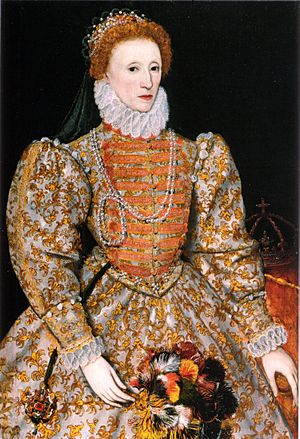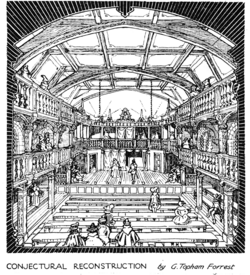Richard Farrant facts for kids
Richard Farrant (born around 1525 – died November 30, 1580) was a talented English composer and playwright. He was also a theater founder and a Master of the Children of the Chapel Royal. We first hear about him in 1552 as a member of the Gentlemen of the Chapel Royal.
During his life, Richard Farrant became a very successful composer. He greatly helped English plays grow and develop. He also started the first Blackfriars Theatre in London. Farrant was also the first to write a special type of music called verse-anthems. He married Anne Bower and they had ten children together.
Contents
Working with Royalty
As a member of the Gentlemen of the Chapel Royal, Farrant was involved in many royal events. He started working with the Chapel Royal around 1550. This was during the time of King Edward VI.
This period was important for Latin Church Music. Composers like William Byrd and Christopher Tye were creating new and exciting church music. During his twelve years there, Farrant took part in royal funerals. These included the funerals for Edward VI and Mary I. He also participated in the coronations for Mary I and Elizabeth I. After this, he became an organist at St. George's Chapel at Windsor.
His Important Jobs
For Richard Farrant, his job at Windsor became permanent. He stayed there for the rest of his life. In November 1569, he also got another important job. He became the Master of the Chapel Royal choristers.
Having choirs from both places meant he could show off his music and plays. Every winter, he even produced a play for Queen Elizabeth I herself! These jobs also let him move back to London in 1576. There, he started a public theater. He would rehearse some of his choir music openly for people to hear. He passed away soon after, in 1580.
Key Contributions to Arts
Many composers in Farrant's time only wrote music. But Farrant was different; he also wrote many plays. One of his most important contributions was creating the first Blackfriars Theatre. This theater became a very important place in London. It helped drama grow during the Renaissance period.
Farrant was also one of the first well-known composers to mix music and plays. This unusual blend helped him create a new style of composition called 'verse.' You can hear this style in many of his pieces. Some examples include the anthems When as we sat in Babylon, Call to remembrance, and Hide not thou thy face.
Known Works
Many of Farrant's works are known today because they were carefully written down. Some are also mentioned briefly in other old documents.
Music Compositions
- Ah, alas, You Salt Sea Gods (found in the Dow Partbooks)
- Call to Remembrance
- Hide Not Thou Thy Face
- Lord, for Thy Tender Mercy's Sake
- Magnificat & Nunc Dimittis
- O Jove, from Stately Throne
- O Sacrum Convivium
- Single Chant in F Major
- Felix Namque
- Voluntarye
Plays and Dramatic Works
- Ajax and Ulysses
- Quintus Fabius
- The History of Mutius Scevola
- Xerxes
- The History of Loyaltie and Bewtie
- The History of Alucius
- Orestes
- Panthea and Abradatas
 | Jackie Robinson |
 | Jack Johnson |
 | Althea Gibson |
 | Arthur Ashe |
 | Muhammad Ali |



